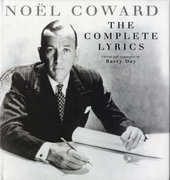
|
The Complete Lyrics of Noel Coward
Hardback
Main Details
| Title |
The Complete Lyrics of Noel Coward
|
| Authors and Contributors |
By (author) Noel Coward
|
|
Edited by Barry Day
|
| Series | World Classics |
|---|
| Physical Properties |
| Format:Hardback | | Pages:264 | | Dimensions(mm): Height 300,Width 280 |
|
| Category/Genre | Musicals
Musical scores and lyrics |
|---|
| ISBN/Barcode |
9780413732309
|
| Classifications | Dewey:782.42164092 |
|---|
| Audience | | General | | Tertiary Education (US: College) | |
|---|
| Illustrations |
250 b&w halftones
|
|
Publishing Details |
| Publisher |
A & C Black Publishers Ltd
|
| Imprint |
Methuen Drama
|
| Publication Date |
12 November 1998 |
| Publication Country |
United Kingdom
|
Description
Includes over 200 newly found lyrics. This is the first time that the complete lyrics of Noel Coward have been published together. Includes sheet music, programmes and photos from original productions.This magnificent collection of over 500 lyrics, richly illustrated with over 200 photographs, will lead the way in celebrating the centenary of Coward's birth in 1999. Some 220 new lyrics and additional verses for existing songs have been discovered by Barry Day and are published here for the first time, along with Day's commentaries about the genesis and context for all the material. This volume made news headlines when it was revealed that a whole cache of new lyrics were discovered in a Swiss bank vault. No one knew that Noel Coward had written so much undiscovered material.The great popular lyricists of the twentieth century can be counted on the fingers of one hand - Lorenz Hart, Ira Gershwin, Cole Porter, Oscar Hammersmith ...and Noel Coward.
Author Biography
Noel Coward made his name as a playwright with The Vortex (1924), in which he also appeared. His numerous other successful plays included Hay Fever, Private Lives, Design for Living, and Blithe Spirit. During the war he wrote screenplays such as Brief Encounter (1944) and This Happy Breed (1942). His volumes of verse, autobiography and letters have all been published to acclaim by Methuen Drama. Coward was knighted in 1970 and died three years later in Jamaica.
Reviews'With all these letters to and from Noel Coward, Barry Day provides copious amplifications and explanations, biographical data and background material. The result is a first-class biography right up there with those by Cole Lesley and Sheridan Morley.' The Scotsman (Dec 2007) Kirkus Review US:'I can only assume that the compulsion to make rhymes was born in me,' declares Noel Coward in the very opening line of his introduction to this book, originally published in 1965. His statement is certainly proved throughout this compilation of over 250 lyrics from his musical shows, operettas and revues. Arranged in decades from the '20s to the '60s, the songs inevitably include such classics as 'Mad About the Boy', 'Mrs Worthington', and 'Mad Dogs and Englishmen', the rhythm and lyrics of the latter having formed in Coward's mind during a drive in 1930 from Hanoi to Saigon. Born in Teddington, Middlesex, in 1899, Coward lived through both world wars and witnessed the decline of the British Empire, and his strong awareness of Englishness shines through his lyrics with songs such as 'There's Always Something Fishy About the French' and 'Don't Let's be Beastly to the Germans'. Coward's introductory notes to each decade are honest and informative. The '40s, much of which he spent travelling throughout the world to entertain Allied troops, he considers his most productive lyric-writing years. In the '50s he writes of his misgivings about playing the Desert Inn in Las Vegas owing to the quintessential Englishness of his material and performance, but subsequently found his enormous success 'one of the most gratifying and stimulating experiences of my life'. This is a great book to browse through rather than read from cover to cover. Coward admits to having been enchanted by Lewis Carroll and Edward Lear, and his confidence in his own verse reflects much of the delightfully nonsensical and irreverent rhymes of these predecessors. While some lines, such as 'Kleine Pupchen, Boop oop adoop-chen', might strike a reader as excruciatingly awful, others such as, 'And with hot bottles at our toes, We cosily in bed repose', leap from the pages with enviable simplicity and charm. (Kirkus UK)
|